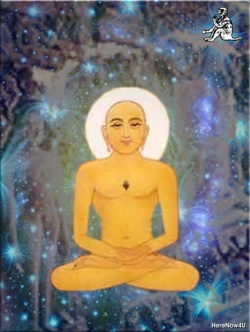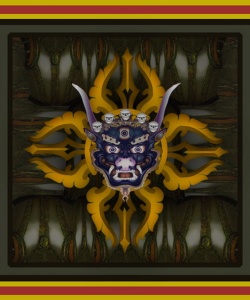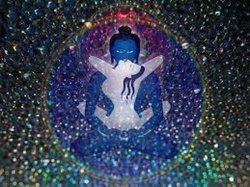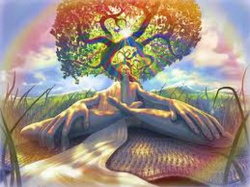Difference between revisions of "Transcendental knowledge"
| (3 intermediate revisions by 2 users not shown) | |||
| Line 2: | Line 2: | ||
<poem> | <poem> | ||
| − | Imperishable [[science]] cannot be taught at the [[intellectual]] level through [[speech]] or [[writing]] as a [[language]] is involved and [[language]] is a [[pure]] structural derivative of [[mental]] [[Wikipedia:concept|concepts]]. The instruction and its {{Wiki|communication}} has to transcend the [[intellectual]] domain. This is the [[reason]] it is called '[[Transcendental]] [[Knowledge]]'. This leads to the examination of the [[nature]] of {{Wiki|communication}} which could not have been {{Wiki|epistemological}} or [[Wikipedia:Ontology|ontological]]. An [[objective]] {{Wiki|world view}} as to the [[nature]] of the supreme would have utterly failed to transmit the true [[knowledge]]. A teleological [[grasping]] of this [[supreme reality]] would also be very limiting as any a posteriori {{Wiki|concept}} would not be beyond falsification. | + | Imperishable [[science]] cannot be [[taught]] at the [[intellectual]] level through [[speech]] or [[writing]] as a [[language]] is involved and [[language]] is a [[pure]] structural derivative of [[mental]] [[Wikipedia:concept|concepts]]. The instruction and its {{Wiki|communication}} has to transcend the [[intellectual]] domain. This is the [[reason]] it is called '[[Transcendental]] [[Knowledge]]'. This leads to the {{Wiki|examination}} of the [[nature]] of {{Wiki|communication}} which could not have been {{Wiki|epistemological}} or [[Wikipedia:Ontology|ontological]]. An [[objective]] {{Wiki|world view}} as to the [[nature]] of the supreme would have utterly failed to transmit the true [[knowledge]]. A teleological [[grasping]] of this [[supreme reality]] would also be very limiting as any [[Wikipedia:Empirical evidence|a posteriori]] {{Wiki|concept}} would not be beyond [[falsification]]. |
| − | The only method which achieves the [[transmission]] of '[[Transcendental | + | The only method which achieves the [[transmission]] of '[[Transcendental Knowledge]]' without corruption is through a [[cosmological]], intuitive [[Wikipedia:scientific method|methodology]]. Today we are classifying in the study of [[consciousness]] the four levels which have an unbroken chain of connectivity. This being [[self]] [[consciousness]], {{Wiki|planetary}} [[consciousness]], Solar [[consciousness]] and Galactic [[consciousness]] ([[cosmic consciousness]]). |
[http://blog.livingspark.net/2013/06/transcendental-knowledge.html blog.livingspark.net] | [http://blog.livingspark.net/2013/06/transcendental-knowledge.html blog.livingspark.net] | ||
| − | + | General [[Transcendent Knowledge]] | |
An Outline of Bernard Lonergan's | An Outline of Bernard Lonergan's | ||
| Line 13: | Line 13: | ||
[[Proof]] of the [[Existence]] of [[God]] | [[Proof]] of the [[Existence]] of [[God]] | ||
| − | [[Insight]], Chapter XIX, Section 1-10 | + | [[Insight]], [[Chapter]] XIX, Section 1-10 |
| Line 19: | Line 19: | ||
(0) [Introductory Paragraphs] | (0) [Introductory Paragraphs] | ||
| − | 0.1 Connection with Chapter XVIII and the rest of the [[book]]. The necessity of both going beyond and conforming to previously considered [[types of knowledge]] if there is or if there is to be a higher {{Wiki|integration}} of [[human]] living than what is provided by man's {{Wiki|social}} relations. | + | 0.1 Connection with [[Chapter]] XVIII and the rest of the [[book]]. The necessity of both going beyond and conforming to previously considered [[types of knowledge]] if there is or if there is to be a higher {{Wiki|integration}} of [[human]] living than what is provided by man's {{Wiki|social}} relations. |
| − | 0.2 Chief among basic [[characteristics]] of [[knowledge]]: the [[determination]] of a {{Wiki|heuristic}} structure which determines in advance of [[knowing]] certain | + | 0.2 Chief among basic [[characteristics]] of [[knowledge]]: the [[determination]] of a {{Wiki|heuristic}} {{Wiki|structure}} which determines in advance of [[knowing]] certain general [[attributes]] of the [[object of knowledge]]. |
Comparison with [[empirical]] [[science]]. | Comparison with [[empirical]] [[science]]. | ||
| − | + | General [[transcendent]] [[knowledge]]: [[knowledge]] that [[God]] is, not what He is. | |
| Line 55: | Line 55: | ||
1.4 {{Wiki|Transcendence}}: The elementary {{Wiki|matter}} of raising further questions. | 1.4 {{Wiki|Transcendence}}: The elementary {{Wiki|matter}} of raising further questions. | ||
| − | Chapter XVIII left us with man's incapacity for sustained development. | + | [[Chapter]] XVIII left us with man's incapacity for sustained [[development]]. |
Is there a higher {{Wiki|integration}} and a higher viewpoint corresponding to it? | Is there a higher {{Wiki|integration}} and a higher viewpoint corresponding to it? | ||
| Line 61: | Line 61: | ||
If so, the necessary {{Wiki|transcendence}} will transcend "hitherto considered procedures of {{Wiki|transcendence}}. | If so, the necessary {{Wiki|transcendence}} will transcend "hitherto considered procedures of {{Wiki|transcendence}}. | ||
| − | 1.5 For Chapter XIX (recalling 0.1), {{Wiki|transcendence}} is a development in man's [[knowledge]] corresponding to a development in man's being. | + | 1.5 For [[Chapter]] XIX (recalling 0.1), {{Wiki|transcendence}} is a [[development]] in man's [[knowledge]] corresponding to a [[development]] in man's being. |
Extrapolation: Its {{Wiki|principles}} will govern the study of [[transcendent]] [[knowledge]]. | Extrapolation: Its {{Wiki|principles}} will govern the study of [[transcendent]] [[knowledge]]. | ||
| Line 75: | Line 75: | ||
2.1 The [[detached]], disinterested, and unrestricted [[desire]] to know is the immanent source of {{Wiki|transcendence}}, the origin of all questions which drive the questioner beyond every given limit. | 2.1 The [[detached]], disinterested, and unrestricted [[desire]] to know is the immanent source of {{Wiki|transcendence}}, the origin of all questions which drive the questioner beyond every given limit. | ||
| − | This [[desire]] is not only the operator of cognitional development, but also the opponent of [[attached]] and [[interested]] [[subjectivity]] and intersubjectivity. | + | This [[desire]] is not only the operator of cognitional [[development]], but also the opponent of [[attached]] and [[interested]] [[subjectivity]] and intersubjectivity. |
2.2 The claim that the [[desire]] to know is unrestricted seems extravagant. | 2.2 The claim that the [[desire]] to know is unrestricted seems extravagant. | ||
| Line 95: | Line 95: | ||
| − | 3. The Notion of [[Transcendent | + | 3. The Notion of [[Transcendent Knowledge]] |
3.1 The range of possible questions is larger than the range of possible answers. | 3.1 The range of possible questions is larger than the range of possible answers. | ||
| Line 115: | Line 115: | ||
2. Cognitional [[activity]] as cognitional, determining positions on self-affirmation, [[knowledge]] of being, and objectivity: Chapters XI-XIII. | 2. Cognitional [[activity]] as cognitional, determining positions on self-affirmation, [[knowledge]] of being, and objectivity: Chapters XI-XIII. | ||
| − | 3. Positions and counterpositions dialectically opposed in accordance with the [[logic]] of self-affirmation (Chapter XIV). This in turn provides a basis for a [[metaphysics]] of proportionate being (Chapters XV-XVII) and an [[ethics]] (Chapter XVIII). | + | 3. Positions and counterpositions dialectically opposed in accordance with the [[logic]] of self-affirmation ([[Chapter]] XIV). This in turn provides a basis for a [[metaphysics]] of proportionate being (Chapters XV-XVII) and an [[ethics]] ([[Chapter]] XVIII). |
| − | 3.5 4. Chapter XIX begins the 4th stage. Being is whatever can be intelligently grasped and reasonably [[affirmed]], proportionate if it lies within the domain of man's [[experience]], [[transcendent]] if lies without. | + | 3.5 4. [[Chapter]] XIX begins the 4th stage. Being is whatever can be intelligently grasped and reasonably [[affirmed]], proportionate if it lies within the domain of man's [[experience]], [[transcendent]] if lies without. |
3.6 This last stage "will contribute to a [[determination]] of the power of the [[human]] [[mind]]." | 3.6 This last stage "will contribute to a [[determination]] of the power of the [[human]] [[mind]]." | ||
| − | 3.7 Because their accounts of proportionate [[knowledge]] are deficient, neither positivists nor Kantians can halt the attempt to demonstrate [[transcendent]] [[knowledge]]. | + | 3.7 Because their accounts of proportionate [[knowledge]] are deficient, neither [[Wikipedia:Positivism|positivists]] nor Kantians can halt the attempt to demonstrate [[transcendent]] [[knowledge]]. |
Positivism is a tissue of counterpositions. | Positivism is a tissue of counterpositions. | ||
| − | Kantianism errs in not [[recognizing]] the constitutive role of the [[unconditioned]] in [[judgment]], a role evident in Kant's schematism of the categories itself. | + | {{Wiki|Kantianism}} errs in not [[recognizing]] the constitutive role of the [[unconditioned]] in [[judgment]], a role evident in Kant's schematism of the categories itself. |
| − | 4. Preliminaries to Conceiving the [[Transcendent]] [[Idea]] | + | 4. Preliminaries to [[Conceiving]] the [[Transcendent]] [[Idea]] |
| − | 4.1 To conceive heuristically the [[transcendent]] [[idea]], we must first extrapolate from proportionate being. | + | 4.1 To [[conceive]] heuristically the [[transcendent]] [[idea]], we must first extrapolate from proportionate being. |
4.2 Just as {{Wiki|mathematics}} is more concrete than [[logic]] yet more abstract than {{Wiki|physics}}, so the {{Wiki|present}} extrapolation lies between mere [[conceptualization]] and [[empirical]] verification. We will, however, be able to verify certain [[elements]] of the extrapolation. | 4.2 Just as {{Wiki|mathematics}} is more concrete than [[logic]] yet more abstract than {{Wiki|physics}}, so the {{Wiki|present}} extrapolation lies between mere [[conceptualization]] and [[empirical]] verification. We will, however, be able to verify certain [[elements]] of the extrapolation. | ||
| Line 143: | Line 143: | ||
2. {{Wiki|Heuristic}} notion of being | 2. {{Wiki|Heuristic}} notion of being | ||
| − | 3. Restricted acts of [[understanding]], conceiving, and [[affirming]] being | + | 3. Restricted acts of [[understanding]], [[conceiving]], and [[affirming]] being |
4. The unrestricted act of [[understanding]] (UAU) | 4. The unrestricted act of [[understanding]] (UAU) | ||
| Line 151: | Line 151: | ||
4.6 The {{Wiki|heuristic}} notion of being is whatever is to be grasped intelligently and [[affirmed]] reasonably. | 4.6 The {{Wiki|heuristic}} notion of being is whatever is to be grasped intelligently and [[affirmed]] reasonably. | ||
| − | 4.7 The [[pure]] [[desire]] to know, because it is reasonable, restricts itself to restricted attainments of [[knowledge]]. This yields only restricted acts of [[understanding]] being. | + | 4.7 The [[pure]] [[desire]] to know, because it is reasonable, restricts itself to restricted [[attainments]] of [[knowledge]]. This yields only restricted acts of [[understanding]] being. |
4.8 Only an UAU being [[knows]] the answer to the question, "What is [the [[essence]] of] being?," for only an UAU has the [[idea]] of being as its content. | 4.8 Only an UAU being [[knows]] the answer to the question, "What is [the [[essence]] of] being?," for only an UAU has the [[idea]] of being as its content. | ||
| Line 165: | Line 165: | ||
on the side of the [[subject]] from restricted to unrestricted [[understanding]], and | on the side of the [[subject]] from restricted to unrestricted [[understanding]], and | ||
| − | on the side of the [[object]] from the structure of proportionate being to the [[transcendent]] [[idea]] of being. | + | on the side of the [[object]] from the {{Wiki|structure}} of proportionate being to the [[transcendent]] [[idea]] of being. |
4.11 Since obscurantism is indefensible, "an extrapolation of the [[idea]] of being is necessary if one is to [[measure]] the power and the limits of the [[human]] [[mind]]." | 4.11 Since obscurantism is indefensible, "an extrapolation of the [[idea]] of being is necessary if one is to [[measure]] the power and the limits of the [[human]] [[mind]]." | ||
| Line 233: | Line 233: | ||
6.5 The [[spiritual]]: {{Wiki|intelligent}} intelligibility, intrinsically {{Wiki|independent}} of the [[empirical]] residue. | 6.5 The [[spiritual]]: {{Wiki|intelligent}} intelligibility, intrinsically {{Wiki|independent}} of the [[empirical]] residue. | ||
| − | As [[essence]], as conceived, is abstracted from the [[empirical]] residue, but does not understand, and so is a [[spiritual]] product, not itself [[spiritual]]. A conceived [[essence]] is a secondary component of an [[idea]]. | + | As [[essence]], as [[conceived]], is abstracted from the [[empirical]] residue, but does not understand, and so is a [[spiritual]] product, not itself [[spiritual]]. A [[conceived]] [[essence]] is a secondary component of an [[idea]]. |
6.6 The primary component of the [[idea]] of being = the UAU. | 6.6 The primary component of the [[idea]] of being = the UAU. | ||
| Line 279: | Line 279: | ||
8.1 If we know what [[causality]] is, we shall be led to affirm that there is an UAU. | 8.1 If we know what [[causality]] is, we shall be led to affirm that there is an UAU. | ||
| − | 8.2 Basic division of [[causes]]: | + | 8.2 Basic [[division]] of [[causes]]: |
| − | Internal [[Causes]] (Chapter XVI) | + | Internal [[Causes]] ([[Chapter]] XVI) |
Central (or "substantial") [[potency]], [[form]], and act | Central (or "substantial") [[potency]], [[form]], and act | ||
| Line 295: | Line 295: | ||
Final | Final | ||
| − | External [[causes]] can be conceived in [[three ways]]: | + | External [[causes]] can be [[conceived]] in [[three ways]]: |
| − | a. In concrete instances: e.g., the erection of a bridge (efficient) according to a plan (exemplary) for a purpose (final). | + | a. In concrete instances: e.g., the erection of a bridge (efficient) according to a plan (exemplary) for a {{Wiki|purpose}} (final). |
b. In [[principle]]: establishing their [[universal]] validity and hence their applicability to the [[universe]] as a whole. | b. In [[principle]]: establishing their [[universal]] validity and hence their applicability to the [[universe]] as a whole. | ||
| Line 321: | Line 321: | ||
If one is tempted to flee to the counterposition on being, he must be reminded that it only invites reversal. | If one is tempted to flee to the counterposition on being, he must be reminded that it only invites reversal. | ||
| − | 8.6 If [[human]] [[knowing]] is confined to the [[realm]] of proportionate being, then [[human]] knowledge is condemned to mere matters of fact. This confinement then strips [[human]] [[knowledge]] not only of [[transcendent]] [[knowledge]], but also of proportionate [[knowledge]]. | + | 8.6 If [[human]] [[knowing]] is confined to the [[realm]] of proportionate being, then [[human]] [[knowledge]] is condemned to mere matters of fact. This confinement then strips [[human]] [[knowledge]] not only of [[transcendent]] [[knowledge]], but also of proportionate [[knowledge]]. |
8.7 [[Knowledge]] consists in a [[grasp]] of the virtually [[unconditioned]], i.e., [[judgment]]. | 8.7 [[Knowledge]] consists in a [[grasp]] of the virtually [[unconditioned]], i.e., [[judgment]]. | ||
| − | But the virtually [[unconditioned]] is a [[conditioned]] state of affairs that only happens to have its [[conditions]] fulfilled. | + | But the virtually [[unconditioned]] is a [[conditioned]] [[state]] of affairs that only happens to have its [[conditions]] fulfilled. |
This mere {{Wiki|matter}} of [[conditional]] fact always invites the further {{Wiki|intelligent}} and reasonable question, which positivistic [[philosophy]] seeks to shut out. | This mere {{Wiki|matter}} of [[conditional]] fact always invites the further {{Wiki|intelligent}} and reasonable question, which positivistic [[philosophy]] seeks to shut out. | ||
| Line 385: | Line 385: | ||
8.22 Thus the demand of 8.4 has been met. | 8.22 Thus the demand of 8.4 has been met. | ||
| − | 8.23 An "{{Wiki|anthropomorphic}}" solution? No, for it is [[pure]] [[intelligence]] while man's [[intelligence]] is in tension between [[pure]] and other [[desire]]. But this tension is not foreign to the [[universe]], which is the [[objective]] of man's [[pure]] [[desire]] to know. | + | 8.23 An "{{Wiki|anthropomorphic}}" {{Wiki|solution}}? No, for it is [[pure]] [[intelligence]] while man's [[intelligence]] is in tension between [[pure]] and other [[desire]]. But this tension is not foreign to the [[universe]], which is the [[objective]] of man's [[pure]] [[desire]] to know. |
| Line 391: | Line 391: | ||
9. The Notion of [[God]] | 9. The Notion of [[God]] | ||
| − | 9.1 We have already conceived the unrestricted act of [[understanding]] (UAU. Now we will work out its implications for arriving at a notion of [[God]]. (26 Points) | + | 9.1 We have already [[conceived]] the unrestricted act of [[understanding]] (UAU. Now we will work out its implications for arriving at a notion of [[God]]. (26 Points) |
9.2 First | 9.2 First | ||
| Line 419: | Line 419: | ||
9.5 Fourth | 9.5 Fourth | ||
| − | The primary being is perfect. Unrestrictedness is [[perfection]], and the primary being is an UAU. Imperfection is a restriction. Therefore, if the UAU were imperfect, it would [[grasp]] restriction in itself. This is impossible. | + | The primary being is {{Wiki|perfect}}. Unrestrictedness is [[perfection]], and the primary being is an UAU. Imperfection is a restriction. Therefore, if the UAU were imperfect, it would [[grasp]] restriction in itself. This is impossible. |
9.6 Fifth | 9.6 Fifth | ||
| Line 431: | Line 431: | ||
[[Perfection]] of the [[spiritual]] requires, not only that the intelligible also be {{Wiki|intelligent}}, but also that affirmable [[truth]] be [[affirmed]] and that the lovable be loved. | [[Perfection]] of the [[spiritual]] requires, not only that the intelligible also be {{Wiki|intelligent}}, but also that affirmable [[truth]] be [[affirmed]] and that the lovable be loved. | ||
| − | Therefore, the UAU = the perfect act of [[affirming]] the primary [[truth]] = the perfect act of [[loving]] the primary good. | + | Therefore, the UAU = the {{Wiki|perfect}} act of [[affirming]] the primary [[truth]] = the {{Wiki|perfect}} act of [[loving]] the primary good. |
These three acts are [[identical]]: separateness would imply imperfection. | These three acts are [[identical]]: separateness would imply imperfection. | ||
| Line 437: | Line 437: | ||
9.8 Seventh | 9.8 Seventh | ||
| − | The primary intelligible = the self-explanatory or it would not be a perfect act of [[understanding]]. | + | The primary intelligible = the self-explanatory or it would not be a {{Wiki|perfect}} act of [[understanding]]. |
9.9 Eighth | 9.9 Eighth | ||
| Line 467: | Line 467: | ||
9.12.1 Eleventh | 9.12.1 Eleventh | ||
| − | The primary being = the UAU = perfect [[affirmation]] = perfect [[loving]] = the primary intelligible = the primary [[truth]] = the primary good. | + | The primary being = the UAU = {{Wiki|perfect}} [[affirmation]] = {{Wiki|perfect}} [[loving]] = the primary intelligible = the primary [[truth]] = the primary good. |
Therefore, the primary being is simple. | Therefore, the primary being is simple. | ||
| Line 479: | Line 479: | ||
9.12.3 | 9.12.3 | ||
| − | Primary being = [[spiritual being]] beyond all development. | + | Primary being = [[spiritual being]] beyond all [[development]]. |
[[Potency]] is the capacity to develop. It is the [[materiality]] or the [[empirical]] residue from which the [[spiritual]] abstracts. Therefore, primary being does not admit the compositeness of [[potency]] and [[form]]. | [[Potency]] is the capacity to develop. It is the [[materiality]] or the [[empirical]] residue from which the [[spiritual]] abstracts. Therefore, primary being does not admit the compositeness of [[potency]] and [[form]]. | ||
| Line 523: | Line 523: | ||
[[Knowing]] is not a looking at something else. | [[Knowing]] is not a looking at something else. | ||
| − | The primary [[object]] is perfect. | + | The primary [[object]] is {{Wiki|perfect}}. |
Therefore, secondary intelligibles need not be {{Wiki|distinct}} [[realities]]. | Therefore, secondary intelligibles need not be {{Wiki|distinct}} [[realities]]. | ||
| Line 537: | Line 537: | ||
Primary good would be imperfect if it could not originate any other instance of the good. | Primary good would be imperfect if it could not originate any other instance of the good. | ||
| − | But primary being/primary good is perfect. | + | But primary being/primary good is {{Wiki|perfect}}. |
Therefore, primary being is the omnipotent [[efficient cause]]. | Therefore, primary being is the omnipotent [[efficient cause]]. | ||
| Line 555: | Line 555: | ||
As being they cannot be arbitrary. | As being they cannot be arbitrary. | ||
| − | Therefore, secondary intelligibles, if they [[exist]], [[exist]] in [[virtue]] of the freedom of unrestricted [[understanding]], perfect [[affirming]], and perfect [[loving]]. | + | Therefore, secondary intelligibles, if they [[exist]], [[exist]] in [[virtue]] of the freedom of unrestricted [[understanding]], {{Wiki|perfect}} [[affirming]], and {{Wiki|perfect}} [[loving]]. |
Therefore, primary being is free. | Therefore, primary being is free. | ||
| Line 573: | Line 573: | ||
[[logic]]: [[Wikipedia:concept|concepts]] and judgments, and | [[logic]]: [[Wikipedia:concept|concepts]] and judgments, and | ||
| − | [[metaphysics]]: enumeration of [[realities]] on the supposition that some judgments are true. | + | [[metaphysics]]: {{Wiki|enumeration}} of [[realities]] on the supposition that some judgments are true. |
9.20.3 Corollary I | 9.20.3 Corollary I | ||
| Line 613: | Line 613: | ||
9.20.8 | 9.20.8 | ||
| − | Scientia media rests on "Aquinas' familiar contentions on the immutability of [[God]] and the [[conditioned]] necessity of what [[God]] [[knows]] or wills or [[causes]]." | + | Scientia media rests on "{{Wiki|Aquinas}}' familiar contentions on the immutability of [[God]] and the [[conditioned]] necessity of what [[God]] [[knows]] or wills or [[causes]]." |
9.21.1 Nineteenth | 9.21.1 Nineteenth | ||
| Line 641: | Line 641: | ||
9.23.1 Twenty-first | 9.23.1 Twenty-first | ||
| − | Only the [[cause]] of the order of the [[universe]] can be the sufficient ground for the occurrence of any event (or development or [[emergence]]). | + | Only the [[cause]] of the order of the [[universe]] can be the sufficient ground for the occurrence of any event (or [[development]] or [[emergence]]). |
Therefore, [[God]] would be the first agent of every event. | Therefore, [[God]] would be the first agent of every event. | ||
| Line 675: | Line 675: | ||
9.24.3 | 9.24.3 | ||
| − | Reconception of finality. Upward yet {{Wiki|indeterminate}} dynamism is from the {{Wiki|perspective}} of proportionate being. There is now the intended [[ordination]] | + | Reconception of finality. Upward yet {{Wiki|indeterminate}} {{Wiki|dynamism}} is from the {{Wiki|perspective}} of proportionate being. There is now the intended [[ordination]] |
of each [[potency]] for the [[form]] it receives, | of each [[potency]] for the [[form]] it receives, | ||
| Line 689: | Line 689: | ||
[[Transformation]] of [[metaphysics]]. | [[Transformation]] of [[metaphysics]]. | ||
| − | The [[metaphysics]] of proportionate being becomes a subordinate part of a more | + | The [[metaphysics]] of proportionate being becomes a subordinate part of a more general, transcendent-envisaging, [[metaphysics]]. |
9.26 Twenty-fourth | 9.26 Twenty-fourth | ||
| Line 717: | Line 717: | ||
Willing vs. failing to will the good one [[knows]]. | Willing vs. failing to will the good one [[knows]]. | ||
| − | [[Contraction]] of [[consciousness]] is the basic [[sin]]: the practical consequences are more conspicuous, but they are really derivative. | + | [[Contraction]] of [[consciousness]] is the basic [[sin]]: the {{Wiki|practical}} {{Wiki|consequences}} are more conspicuous, but they are really derivative. |
9.27.3 | 9.27.3 | ||
| − | [[Moral]] [[evils]]: the consequences of basic [[sin]]. | + | [[Moral]] [[evils]]: the {{Wiki|consequences}} of basic [[sin]]. |
9.27.4 | 9.27.4 | ||
| − | [[Physical]] [[evils]]: all the shortcomings of a [[world]] order that consists, in so far as we understand it, in a generalized emergent probability. | + | [[Physical]] [[evils]]: all the shortcomings of a [[world]] order that consists, in so far as we understand it, in a generalized emergent {{Wiki|probability}}. |
9.27.5 | 9.27.5 | ||
| Line 761: | Line 761: | ||
The good is the intelligible. | The good is the intelligible. | ||
| − | Therefore, sensitive [[pleasure]] and [[pain]] are not the criterion of [[good and evil]]. | + | Therefore, [[sensitive]] [[pleasure]] and [[pain]] are not the criterion of [[good and evil]]. |
Therefore, [[physical]] and [[moral]] [[evils]] are not ultimately [[evil]]. | Therefore, [[physical]] and [[moral]] [[evils]] are not ultimately [[evil]]. | ||
| − | + | General emergent {{Wiki|probability}} is an intelligible order within which only basic [[sin]] is left unexplained. | |
9.28 Twenty-sixth | 9.28 Twenty-sixth | ||
| Line 771: | Line 771: | ||
As man, so [[God]] is a [[rational]] [[self-consciousness]]. | As man, so [[God]] is a [[rational]] [[self-consciousness]]. | ||
| − | The notion of [[God]] satisfies all that is meant by the [[subject]], the [[person]], the other with his own [[intelligence]], reasonableness, and willing. | + | The notion of [[God]] satisfies all that is meant by the [[subject]], the [[person]], the other with his [[own]] [[intelligence]], reasonableness, and willing. |
9.29 | 9.29 | ||
| Line 791: | Line 791: | ||
10.2 [[God]] is real = [[God]] is an [[object]] of reasonable [[affirmation]] = [[God]] [[exists]]. | 10.2 [[God]] is real = [[God]] is an [[object]] of reasonable [[affirmation]] = [[God]] [[exists]]. | ||
| − | 10.3 "[[God]] [[exists]]" is not about Existenz or Dasein. | + | 10.3 "[[God]] [[exists]]" is not about Existenz or [[Dasein]]. |
10.4 The yes of reasonable [[affirmation]] varies in meaning with the question it answers. | 10.4 The yes of reasonable [[affirmation]] varies in meaning with the question it answers. | ||
| Line 801: | Line 801: | ||
10.6 What and whether [[God]] [[exists]] are two different questions for us. | 10.6 What and whether [[God]] [[exists]] are two different questions for us. | ||
| − | We [[grasp]] the notion of [[God]], not by an unrestricted act of [[understanding]], but rather by an act of restricted [[understanding]] which extrapolates from the latter to the former. | + | We [[grasp]] the notion of [[God]], not by an unrestricted act of [[understanding]], but rather by an act of restricted [[understanding]] which extrapolates from the [[latter]] to the former. |
So the question of the [[reality]] of the extrapolated notion remains. | So the question of the [[reality]] of the extrapolated notion remains. | ||
| Line 811: | Line 811: | ||
"[[God]] [[exists]]" may indeed be an analytical proposition, and its {{Wiki|denial}} may indeed be self-contradictory, but it can become an analytical [[principle]] only when its terms (in this case, "[[God]]') appear in a concrete [[judgment]] of fact. | "[[God]] [[exists]]" may indeed be an analytical proposition, and its {{Wiki|denial}} may indeed be self-contradictory, but it can become an analytical [[principle]] only when its terms (in this case, "[[God]]') appear in a concrete [[judgment]] of fact. | ||
| − | 10.7.2 Contra Anselm: Deus est quo maius cogitari nequit is but an analytical [[principle]]. | + | 10.7.2 Contra Anselm: [[Deus]] est quo maius cogitari nequit is but an analytical [[principle]]. |
10.7.3 Contra {{Wiki|Descartes}}: He relies on a [[view]] of [[knowing]] as looking. | 10.7.3 Contra {{Wiki|Descartes}}: He relies on a [[view]] of [[knowing]] as looking. | ||
| Line 819: | Line 819: | ||
10.8.1 There seems to be no way of verifying [[God]] in our [[experience]]. | 10.8.1 There seems to be no way of verifying [[God]] in our [[experience]]. | ||
| − | 10.8.2 But there is a problem only if verification is limited to [[empirical]] verification. The law of gravity, e.g., is not [[experienced]], but it is verified in [[judgment]]. Reflective [[grasp]] of the [[unconditioned]] is the [[heart]] of all verification, including that of the [[existence]] of [[God]]. | + | 10.8.2 But there is a problem only if verification is limited to [[empirical]] verification. The law of {{Wiki|gravity}}, e.g., is not [[experienced]], but it is verified in [[judgment]]. Reflective [[grasp]] of the [[unconditioned]] is the [[heart]] of all verification, including that of the [[existence]] of [[God]]. |
10.8.3 The transition from analytic proposition to analytic [[principle]] is one between different types of [[unconditioned]]; only secondarily does it resemble verification. | 10.8.3 The transition from analytic proposition to analytic [[principle]] is one between different types of [[unconditioned]]; only secondarily does it resemble verification. | ||
| Line 835: | Line 835: | ||
10.10.1 | 10.10.1 | ||
| − | The following | + | The following general [[form]] covers all {{Wiki|theistic}} arguments: |
10.10.2 | 10.10.2 | ||
| Line 909: | Line 909: | ||
(B) [[Spiritual]] intelligibility: in [[understanding]]. Incomplete as long as it is restricted, as long as it can inquire. | (B) [[Spiritual]] intelligibility: in [[understanding]]. Incomplete as long as it is restricted, as long as it can inquire. | ||
| − | (C) Abstract intelligibility: in [[Wikipedia:concept|concepts]] of unities, laws, {{Wiki|ideal}} frequencies, genetic operators, and [[dialectical]] tensions and conflicts. Incomplete, for it arises only in the self-expression of [[spiritual]] intelligibility. | + | (C) Abstract intelligibility: in [[Wikipedia:concept|concepts]] of unities, laws, {{Wiki|ideal}} frequencies, {{Wiki|genetic}} operators, and [[dialectical]] tensions and conflicts. Incomplete, for it arises only in the self-expression of [[spiritual]] intelligibility. |
10.10.8.4 | 10.10.8.4 | ||
| Line 931: | Line 931: | ||
The real is being which is what is intelligently grasped and reasonably [[affirmed]]. | The real is being which is what is intelligently grasped and reasonably [[affirmed]]. | ||
| − | Therefore, [[God]] is a being if He is intelligently conceived and reasonably [[affirmed]]. | + | Therefore, [[God]] is a being if He is intelligently [[conceived]] and reasonably [[affirmed]]. |
| − | Further, [[intelligence]] is committed to the [[effort]] to conceive [[God]] by way of the question, What is being? The question for {{Wiki|reflection}}, Does [[God]] [[exist]]?, follows naturally. | + | Further, [[intelligence]] is committed to the [[effort]] to [[conceive]] [[God]] by way of the question, What is being? The question for {{Wiki|reflection}}, Does [[God]] [[exist]]?, follows naturally. |
Only three answers are possible: | Only three answers are possible: | ||
| Line 967: | Line 967: | ||
complete intelligibility with [[God]]. | complete intelligibility with [[God]]. | ||
| − | (A) is the expansive moment: | + | (A) is the expansive [[moment]]: |
The real is being entails | The real is being entails | ||
| Line 1,003: | Line 1,003: | ||
(3) Contradiction is possible only if [[reality]] is not completely intelligible. | (3) Contradiction is possible only if [[reality]] is not completely intelligible. | ||
| − | (4) The unrestricted act is single, and so the contradictory cannot arise from it. | + | (4) The unrestricted act is single, and so the [[contradictory]] cannot arise from it. |
| − | (5) All that can be is grounded in this act, and so the contradictory cannot be. | + | (5) All that can be is grounded in this act, and so the [[contradictory]] cannot be. |
</poem> | </poem> | ||
{{R}} | {{R}} | ||
[http://www.anthonyflood.com/lonerganproofofgod.htm www.anthonyflood.com/] | [http://www.anthonyflood.com/lonerganproofofgod.htm www.anthonyflood.com/] | ||
[[Category:Buddhist Philosophy]] | [[Category:Buddhist Philosophy]] | ||
Latest revision as of 01:43, 16 March 2015
Imperishable science cannot be taught at the intellectual level through speech or writing as a language is involved and language is a pure structural derivative of mental concepts. The instruction and its communication has to transcend the intellectual domain. This is the reason it is called 'Transcendental Knowledge'. This leads to the examination of the nature of communication which could not have been epistemological or ontological. An objective world view as to the nature of the supreme would have utterly failed to transmit the true knowledge. A teleological grasping of this supreme reality would also be very limiting as any a posteriori concept would not be beyond falsification.
The only method which achieves the transmission of 'Transcendental Knowledge' without corruption is through a cosmological, intuitive methodology. Today we are classifying in the study of consciousness the four levels which have an unbroken chain of connectivity. This being self consciousness, planetary consciousness, Solar consciousness and Galactic consciousness (cosmic consciousness).
blog.livingspark.net
General Transcendent Knowledge
An Outline of Bernard Lonergan's
Proof of the Existence of God
Insight, Chapter XIX, Section 1-10
(0) [Introductory Paragraphs]
0.1 Connection with Chapter XVIII and the rest of the book. The necessity of both going beyond and conforming to previously considered types of knowledge if there is or if there is to be a higher integration of human living than what is provided by man's social relations.
0.2 Chief among basic characteristics of knowledge: the determination of a heuristic structure which determines in advance of knowing certain general attributes of the object of knowledge.
Comparison with empirical science.
General transcendent knowledge: knowledge that God is, not what He is.
1. The Notion of Transcendence
1.1 Transcendent vs. Immanence
Common view of knowing models it on looking.
Error is then a matter of seeing what is not there or not seeing what is there.
Correction is then only possible by other "super" looks that are subject to the same difficulty.
Knowing is immanent:
1. It occurs within the knower.
2. What is known is nothing but the content immanent within the act of knowing.
1.2 The argument for knowing-as-looking is not itself a looking, but rather an exercise of intelligence and reasonableness.
1.3 Transcendence as going beyond.
Present study has revealed a progression of "goings beyond."
Is human knowledge confined to the universe of proportionate being?
1.4 Transcendence: The elementary matter of raising further questions.
Chapter XVIII left us with man's incapacity for sustained development.
Is there a higher integration and a higher viewpoint corresponding to it?
If so, the necessary transcendence will transcend "hitherto considered procedures of transcendence.
1.5 For Chapter XIX (recalling 0.1), transcendence is a development in man's knowledge corresponding to a development in man's being.
Extrapolation: Its principles will govern the study of transcendent knowledge.
Man has in fact extrapolated from the past through the present to the future.
Can he extrapolate beyond proportionate being to transcendent being?
2. The Immanent Source of Transcendence
2.1 The detached, disinterested, and unrestricted desire to know is the immanent source of transcendence, the origin of all questions which drive the questioner beyond every given limit.
This desire is not only the operator of cognitional development, but also the opponent of attached and interested subjectivity and intersubjectivity.
2.2 The claim that the desire to know is unrestricted seems extravagant.
2.3 The claim does not mean that man's understanding is unrestricted, for unrestricted understanding would exclude the possibility of any desire to understand.
2.4 The claim does not mean that man's attainment of understanding will be unrestricted, for such attainment has conditions of which unrestricted desire is but one.
2.5 The claim does not mean that the desire to know everything entails a duty to know everything or an expectation that man will know everything.
2.6 Whereas restricted desire to understand opposes total obscurantism, unrestricted desire opposes every partial as well as total obscurantism.
2.7 Historically, there is no evidence that we are running out of questions to ask.
2.8 Logically, the pure desire to know is unrestricted, because its object, being, is unrestricted.
2.9 Doubt as to the unrestricted character of my desire to know proves that this desire is active, concerning itself with "what lies beyond a suspected limited horizon."
3. The Notion of Transcendent Knowledge
3.1 The range of possible questions is larger than the range of possible answers.
"The requirement is a critical survey of possible questions" for setting aside those that cannot be answered and limiting oneself to those that can.
3.2 A prior critical inquiry into possibility will itself require a grounding, and so will that grounding, etc., ad infinitum.
Only an appeal to fact can settle a question of what is possible.
Analytical principles—analytical propositions with terms that occur in judgments of fact—will alone be of use.
3.3 The fact of knowledge determines the possibility of knowledge.
3.4 Insight has four stages:
1. Cognitional activity as activity: Chapters I-X.
2. Cognitional activity as cognitional, determining positions on self-affirmation, knowledge of being, and objectivity: Chapters XI-XIII.
3. Positions and counterpositions dialectically opposed in accordance with the logic of self-affirmation (Chapter XIV). This in turn provides a basis for a metaphysics of proportionate being (Chapters XV-XVII) and an ethics (Chapter XVIII).
3.5 4. Chapter XIX begins the 4th stage. Being is whatever can be intelligently grasped and reasonably affirmed, proportionate if it lies within the domain of man's experience, transcendent if lies without.
3.6 This last stage "will contribute to a determination of the power of the human mind."
3.7 Because their accounts of proportionate knowledge are deficient, neither positivists nor Kantians can halt the attempt to demonstrate transcendent knowledge.
Positivism is a tissue of counterpositions.
Kantianism errs in not recognizing the constitutive role of the unconditioned in judgment, a role evident in Kant's schematism of the categories itself.
4. Preliminaries to Conceiving the Transcendent Idea
4.1 To conceive heuristically the transcendent idea, we must first extrapolate from proportionate being.
4.2 Just as mathematics is more concrete than logic yet more abstract than physics, so the present extrapolation lies between mere conceptualization and empirical verification. We will, however, be able to verify certain elements of the extrapolation.
4.3 Being has been identified with the real. But what is being?
4.4 There are four clues:
1. Pure notion of being
2. Heuristic notion of being
3. Restricted acts of understanding, conceiving, and affirming being
4. The unrestricted act of understanding (UAU)
4.5 The pure notion of being is the pure desire to know. It is the ground of intelligent inquiry and critical reflection. It is called a "notion" because it is intelligent desire.
4.6 The heuristic notion of being is whatever is to be grasped intelligently and affirmed reasonably.
4.7 The pure desire to know, because it is reasonable, restricts itself to restricted attainments of knowledge. This yields only restricted acts of understanding being.
4.8 Only an UAU being knows the answer to the question, "What is [the essence of] being?," for only an UAU has the idea of being as its content.
4.9 The idea of being "assigns the limit to the whole process of going beyond" and is therefore absolutely transcendent.
4.10 The fact of extrapolation to transcendent knowledge proves its possibility.
Although man cannot enjoy an UAU, he can still determine heuristically a number of features of the answer to the question, "What is being?"
He can do this by a dual extrapolation:
on the side of the subject from restricted to unrestricted understanding, and
on the side of the object from the structure of proportionate being to the transcendent idea of being.
4.11 Since obscurantism is indefensible, "an extrapolation of the idea of being is necessary if one is to measure the power and the limits of the human mind."
5. The Idea of Being
5.1 An idea is the content of an act of understanding.
5.2 "Being is the objective of the unrestricted desire to know. Therefore, the idea of being is the content of an UAU."
5.3 The idea of being leaves nothing to be understood and so is absolutely transcendent.
5.4 Being "is completely universal and completely concrete. Therefore, the idea of being is the content of an act of understanding that grasps everything about everything."
5.5 The idea of being is the total range of intelligibility.
5.6 The idea of being is the idea of the good, because the good is the intelligible.
5.7 The UAU is one act.
5.8 The idea of being is one idea.
5.9 The idea of being is one, but of many; immaterial, but of the material; nontemporal, but of the temporal; nonspatial, but of the spatial.
5.10 What is possible for restricted understanding is not beyond the attainment of unrestricted understanding; and so 5.9 affirms no paradox.
5.11 The idea of being has a primary component and a secondary component.
The primary component is the principle by which the secondary is understood.
Inasmuch as there is a single act of understanding, there is a primary component.
Insofar as the primary grasps itself, the secondary is understood.
(Idea = intelligently grasping intelligibility + nonintelligent grasped intelligibility)
6. The Primary Component in the Idea of Being
6.1 The primary component in the idea of being consists in the unrestricted act's self-understanding.
The secondary component consists in the unrestricted act's understanding of everything else because it understands itself.
6.2 The duality of knower and known is not found in the idea of being.
Knowing is knowing being. Only relevant judgments can determine the difference between or identity of knower and known.
6.3 Ordinarily, "intelligibility" denotes what can be understood.
More profoundly, "intelligibility" denotes the primary component of an idea,
the intelligible that is also intelligent,
the generative insight itself as distinct from its issue,
"the ground or key or root from which results intelligibility in the ordinary sense."
To understand the primary component of an idea is to understand understanding; to understand the secondary component, it is not necessary to understand understanding.
6.4 For example, the generative principle of the series of positive integers is the insight without which one can do arithmetic, but not grasp the idea of positive integers. That is, positive integers are intelligible, but not intelligent. The insight into positive integers is an intelligent intelligible that makes the idea of positive integers possible.
Without some understanding of understanding, there can be no primary component of an idea and hence no idea.
6.5 The spiritual: intelligent intelligibility, intrinsically independent of the empirical residue.
As essence, as conceived, is abstracted from the empirical residue, but does not understand, and so is a spiritual product, not itself spiritual. A conceived essence is a secondary component of an idea.
6.6 The primary component of the idea of being = the UAU.
6.7 The UAU must understand itself, and so must understand itself as unrestricted; it must therefore, understand its content, its product, its issue, namely, the secondary component. The unrestricted act, understanding itself, thereby understands everything else.
6.8 The UAU is the insight which, if understood, grasps everything about everything else. Therefore, we are justified in calling that insight the primary component in the idea of being.
6.9 The primary component in the idea of being is the primary intelligible and is identical with intelligence in act.
The secondary component in the idea of being is the (class of the) secondary intelligibles and are the primary's products, grasped inasmuch as the primary understands itself. Intelligible only in the ordinary sense: understood, but not understanding.
7. The Secondary Component in the Idea of Being
7.1 It seems that the nonsystematic component in this and other possible universes excludes the possibility of an unrestricted act.
7.2 But from the viewpoint of the unrestricted act, the nonsystematic vanishes.
7.3 Abstract laws can be concretely applied only in conjunction with further determinations which can be brought under a different, i.e., statistical, type law. Both recurrent patterns and diverging series of conditions are intelligible.
7.4 But their intelligibility does not lie on the level of abstract grasps of systems of laws: their intelligibility is that of the particular, and so is concrete.
Abstract-classical and concrete-statistical laws are mutually conditioning as well as complementary.
(a) Given information on all events + knowledge of all laws, one can find the concrete pattern
(b) Given information on the concrete pattern + knowledge of all laws, one can deduce all events
But (a)'s proviso is (b)'s conclusion, and (b)'s proviso is (a)'s conclusion.
7.5 Unrestricted understanding does not proceed this way, but rather "from a grasp of itself; it does not attempt the impossible task of relating through an abstract system the concrete patterns but grasps the lot of them inasmuch as it understands itself." It has no use either for deduction or prediction, since it grasps all events and all concrete patterns at once.
7.6 Deduction and prediction are
impossible for restricted understanding, because the manifold of concrete patterns of diverging series of scattering conditions can never be systematized.
impossible for unrestricted understanding, because it does not advance in knowledge: it is outside of all temporal sequence while grasping the totality of temporal sequences.
8. Causality
8.1 If we know what causality is, we shall be led to affirm that there is an UAU.
8.2 Basic division of causes:
Internal Causes (Chapter XVI)
Central (or "substantial") potency, form, and act
Conjugate (or "accidental") potency, form, and act
External Causes
Efficient
Exemplary
Final
External causes can be conceived in three ways:
a. In concrete instances: e.g., the erection of a bridge (efficient) according to a plan (exemplary) for a purpose (final).
b. In principle: establishing their universal validity and hence their applicability to the universe as a whole.
c. In their fullness: theism is the principles' fullness which has heretofore been only implicit. Its yield is a first agent, primary exemplar, and a last end of the universe of proportionate being.
8.4 Efficient, exemplary, and final causality are facts. Our present question is whether these facts are instances of a principle that can bear human knowing from the realm of proportionate being to that of transcendent being.
8.5 Being is intelligible.
What is apart from being is nothing.
Therefore, what is apart from the intelligible is nothing.
Matters of fact which admit of no explanation are unintelligible.
Therefore, matters of fact which admit of no explanation are nothing.
If existence or occurrence is a mere matter of fact, it is nothing.
Knowing and the known are nothing if they are mere matters of fact.
If one is tempted to flee to the counterposition on being, he must be reminded that it only invites reversal.
8.6 If human knowing is confined to the realm of proportionate being, then human knowledge is condemned to mere matters of fact. This confinement then strips human knowledge not only of transcendent knowledge, but also of proportionate knowledge.
8.7 Knowledge consists in a grasp of the virtually unconditioned, i.e., judgment.
But the virtually unconditioned is a conditioned state of affairs that only happens to have its conditions fulfilled.
This mere matter of conditional fact always invites the further intelligent and reasonable question, which positivistic philosophy seeks to shut out.
8.8 Every proportionate being (one known through experience, understanding, and judgment) is a virtually unconditioned: its conditions happen to be fulfilled.
Therefore, if a proportionate being is taken to be ultimate, i.e., without explanation, then either that proportionate being is not being (because unintelligible), or being is not intelligible (a counterposition).
8.9 This is the nerve of the argument.
8.10 The most fundamental question asks about existence.
Neither empirical science nor methodically restricted philosophy can adequately or at all handle this question, for they have to assume existence as a mere matter of fact, since its range is that or proportionate being.
8.11 The same also holds for occurrence.
8.12 The contingency of existence and occurrence penetrates everything that empirical science and methodically restricted philosophy are to know.
8.13 (1) Being is intelligible, and mere matters of fact are nothing.
(2) Proportionate being presents only mere matters of fact.
(3) Therefore, proportionate being might not be all the being there is; we cannot exclude transcendent being from consideration.
8.14 A transcendent being relevant to our problem; that is, such a being
(1) must not be contingent in any respect as this would only reproduce the problem, and
(2) must ground the explanation of everything else, or the problem would remain.
8.15 Proportionate being exists and exists contingently, i.e., it is known by a grasp of the virtually unconditioned.
Therefore, proportionate being is not ultimate.
Therefore, some other being is ultimate and is not contingent, and is therefore formally unconditioned because it has no conditions at all.
This other being must be self-explanatory and capable of explaining everything else, thereby relieving proportionate being of its apparently brute facticity.
8.16 We need only formulate correctly the facts of external causality.
8.17 The formally unconditioned, which the pure desire to know anticipates, would be the truly efficient cause of proportionate being, because it would be capable of grounding the conditions of everything else. Neither chains of infinite regress or cycles of recurrence are so capable.
8.18 The formally unconditioned efficient cause must also be the exemplary cause of proportionate being, because that cause would ground the intelligibility in the pattern in which the conditions are fulfilled. Without such an exemplary cause, the conditions are fulfilled at random, which is unintelligible.
8.19 The formally unconditioned efficient and exemplary cause must also be the final cause of proportionate being, if being is the intelligible and the intelligible is the good. The actual order of the universe of proportionate being must be a value whose selection is due to rational choice.
8.20 (Review of 8.5 through 8.19)
8.21 As the final cause of proportionate being, the formally unconditioned is the ground of value and overcomes contingency at its deepest level.
Contingent, proportionate being must be a reasonably realized possibility:
Its possibility lies in the exemplary cause.
Its realization lies in the efficient cause.
Its reasonableness lies in the final cause.
8.22 Thus the demand of 8.4 has been met.
8.23 An "anthropomorphic" solution? No, for it is pure intelligence while man's intelligence is in tension between pure and other desire. But this tension is not foreign to the universe, which is the objective of man's pure desire to know.
9. The Notion of God
9.1 We have already conceived the unrestricted act of understanding (UAU. Now we will work out its implications for arriving at a notion of God. (26 Points)
9.2 First
The UAU is the primary intelligible (see 6.9)
9.3 Second
To grasp the unconditioned is an act of reflective understanding.
The UAU grasps itself as unconditioned.
(The unconditioned as grasped by reflective understanding is truth)
Therefore, the primary intelligible is the primary truth.
9.4 Third
What intelligence and reason knows is being.
The primary intelligible understands itself.
Therefore, the primary intelligible is the primary being.
Also: Primary being = the intelligent + the intelligible = the spiritual.
9.5 Fourth
The primary being is perfect. Unrestrictedness is perfection, and the primary being is an UAU. Imperfection is a restriction. Therefore, if the UAU were imperfect, it would grasp restriction in itself. This is impossible.
9.6 Fifth
The good is the intelligible.
Therefore, the primary intelligible is the primary good.
9.7 Sixth
Perfection of the spiritual requires, not only that the intelligible also be intelligent, but also that affirmable truth be affirmed and that the lovable be loved.
Therefore, the UAU = the perfect act of affirming the primary truth = the perfect act of loving the primary good.
These three acts are identical: separateness would imply imperfection.
9.8 Seventh
The primary intelligible = the self-explanatory or it would not be a perfect act of understanding.
9.9 Eighth
The primary being = the primary intelligible = the formally unconditioned
Therefore, the primary being = the formally unconditioned.
9.10 Ninth
The primary being = the self-explanatory = noncontingent.
Therefore, the primary being is either necessary or impossible.
(That is, the primary being cannot be merely possible, depending upon conditions, for the primary being is the formally unconditioned. Therefore, if the primary being is not impossible as well noncontingent then, necessarily, the primary being is a necessary being.)
9.11 Tenth
There is no necessity for more than one primary being.
If there were more than one primary being, then either there would be or there would not be more than one UAU.
If there were not, then some primary beings would be restricted acts of understanding, which is impossible.
If there were, then there would be more than one UAU differing from each other only empirically, which is impossible.
Therefore, there can be only one primary being.
9.12.1 Eleventh
The primary being = the UAU = perfect affirmation = perfect loving = the primary intelligible = the primary truth = the primary good.
Therefore, the primary being is simple.
9.12.2
Primary being does not share an order with other beings: it is simply a single act.
Therefore, primary being does not admit the compositeness of central and conjugate forms.
9.12.3
Primary being = spiritual being beyond all development.
Potency is the capacity to develop. It is the materiality or the empirical residue from which the spiritual abstracts. Therefore, primary being does not admit the compositeness of potency and form.
9.12.4
Primary being's "form" or "essence" (primary intelligible/being/good) =
Primary being's "act" or "existence" (unrestricted act of understanding/affirming/loving)
Therefore, primary being does not admit the compositeness of distinct form and act.
If the primary being exists, then it does so necessarily: its act is not the realization of a mere thought.
9.13 Twelfth
Continuous time presupposes the empirical residues and materiality.
The primary being is spiritual and does not develop.
Therefore, primary being is timeless.
9.14 Thirteenth
Eternity is timeless existence. Therefore, primary being is eternal.
9.15
We shall now consider secondary intelligibles.
9.16.1 Fourteenth
Secondary intelligibles are understood if the primary intelligible is understood.
Therefore, secondary intelligibles are conditioned.
9.16.2
Therefore, secondary intelligibles are distinct from the primary intelligible.
9.16.3
Knowing is not a looking at something else.
The primary object is perfect.
Therefore, secondary intelligibles need not be distinct realities.
9.16.4
Secondary intelligibles may be mere objects of thought.
9.17 Fifteenth
Primary being would be imperfect if it could not ground a possible universe as a reality.
Primary good would be imperfect if it could not originate any other instance of the good.
But primary being/primary good is perfect.
Therefore, primary being is the omnipotent efficient cause.
9.18 Sixteenth
Primary being is the idea of being which grasps the intelligible order of every possible universe in every detail.
Therefore, primary being is the omniscient exemplary cause.
9.19 Seventeenth
Secondary intelligibles are conditioned in their being.
As conditioned they cannot be necessitated.
As being they cannot be arbitrary.
Therefore, secondary intelligibles, if they exist, exist in virtue of the freedom of unrestricted understanding, perfect affirming, and perfect loving.
Therefore, primary being is free.
9.20.1 Eighteenth
Primary being does not develop.
Therefore, understanding, affirming, and willing, unlike in man, do not being increment and change in the primary being when it understands/affirms/wills contingent being.
9.20.2
Certain conclusions follow which depend on the distinction between
grammar: words and sentences
logic: concepts and judgments, and
metaphysics: enumeration of realities on the supposition that some judgments are true.
9.20.3 Corollary I
Every contingent predication about God [first occurrence of "God"] is also an extrinsic denomination.
God is the same whether or not He understands, affirms, wills, or causes this or that universe to be.
9.20.4 Corollary II
The extrinsic denominator is temporal, but the contingent predication can be eternal.
9.20.5 Corollary III
Divine efficacy:
X's existence or occurrence is a metaphysical condition:
(1) God understands/affirms/wills X's existence or occurrence; and
(2) X exists or occurs as God understands/affirms/wills it.
9.20.6 Corollary IV
Divine necessity does not impose necessity upon its consequents.
The necessity of the deduction of X's existence/occurrence from God's knowing X is not a metaphysical necessity, but rather the conditioned necessity that the logic of knowing governs.
9.20.7 Corollary V
Scientia media: God knows Corollaries I-IV.
God knows that whatever world order He wills would be willed down to the last detail.
Some of those details are exercises of free will.
Therefore: "God knows exactly what every free will would choose in each successive set of circumstances contained in each possible world order."
9.20.8
Scientia media rests on "Aquinas' familiar contentions on the immutability of God and the conditioned necessity of what God knows or wills or causes."
9.21.1 Nineteenth
God's efficient causality would not depend upon the unexplained existence of some matter. Nor would He be limited to fashioning and ordering this matter.
Therefore, God would be the creator of the universe.
9.21.2
God's creative decision accounts for the empirical residue, so there is no need to consign the universe to the category of the unexplained.
The empirical residue grounds the manifold of the potential good, standing under the good of world order, thereby possessing value accruing to the contingent through the reasonableness of the freedom of God.
9.22 Twentieth
God's efficient causality is being exercised as long as the universe or any of its parts exists.
"A cause B" means "B is emerging into intelligible dependence upon A."
It does not refer to an "imaginable 'influence' occupying the space intermediate between A and B."
Every contingent being is in intelligible dependence upon self-explanatory being.
Therefore, God would be the conserver.
9.23.1 Twenty-first
Only the cause of the order of the universe can be the sufficient ground for the occurrence of any event (or development or emergence).
Therefore, God would be the first agent of every event.
9.23.2
God applies every contingent agent to its operation, because He is the first cause of every occurrence of the fulfillment of that operation's conditions. This is because He is the cause of the order of the universe. Those occurrences take place in harmony with that order.
9.23.3
Contra Bañez and Molina, God controls each event because He controls all. He controls all because He alone is the cause of the order of the universe upon which order every event depends.
9.24.1 Twenty-second
The primary intelligible grasps every other intelligible.
The primary being originates every other being.
The primary good is the source of other instances of the good.
Secondary intelligibles/contingent beings/other instances of the good owe their existence to the primary intelligence/being/good.
Therefore, God would be the ultimate final cause of any universe, the ground of its value, and the ultimate objective of all finalistic striving.
9.24.2
A value is a possible object of reasonable choice.
Any actual world order is chosen by a willing identical with the unrestricted act of understanding.
Therefore, God would be the ground of the value of any world order, a ground identical with the standard of true value.
9.24.3
Reconception of finality. Upward yet indeterminate dynamism is from the perspective of proportionate being. There is now the intended ordination
of each potency for the form it receives,
of each form for the act it receives, and
of each manifold for the higher integration that subsumes it.
Everything is designed to bring about the order of the universe in the way that it does.
9.25 Twenty-third
Transformation of metaphysics.
The metaphysics of proportionate being becomes a subordinate part of a more general, transcendent-envisaging, metaphysics.
9.26 Twenty-fourth
Transformation of ethics.
The consistency of doing and knowing.
Knowing is elevated to an apprehension of the divinely created order.
Doing consistent with knowing is elevated to co-operation with God in the realization of the order of the universe.
Error becomes sin against God.
9.27.1 Twenty-fifth
10 Points on Evil and Sin
If God is the efficacious cause of everything in the universe, is He the author of all its evils and responsible for all its sins?
9.27.2
Basic sin: free will's failure to choose an obligatory, or reject a morally reprehensible, course of action.
This is the root of the irrational in man's consciousness.
Willing vs. failing to will the good one knows.
Contraction of consciousness is the basic sin: the practical consequences are more conspicuous, but they are really derivative.
9.27.3
Moral evils: the consequences of basic sin.
9.27.4
Physical evils: all the shortcomings of a world order that consists, in so far as we understand it, in a generalized emergent probability.
9.27.5
Intelligence must grasp this three-fold distinction.
9.27.6
Basic sin invokes an inverse insight: there is no intelligibility to be grasped.
Sin is the irrational: there is no "reason" for it: it is the failure to yield to reason.
9.27.7
Therefore, basic sin cannot be in intelligible dependence on anything else.
Therefore, basic sin can have no cause.
Therefore, God cannot be its cause or the cause of its consequent moral evils.
Basic sin is not an event: it is the failure of occurrence, the absence of will.
9.27.8
"Besides what is positively and what simply is not, there is the irrational constituted by what could and ought to be but is not."
The irrational is neither caused nor uncaused by God: He simply permits it to be perpetuated by others.
9.27.9
God created rationally self-conscious and hence free beings and leaves that freedom intact. This is good, even though basic sins will and do occur.
9.27.10
The good is the intelligible.
Therefore, sensitive pleasure and pain are not the criterion of good and evil.
Therefore, physical and moral evils are not ultimately evil.
General emergent probability is an intelligible order within which only basic sin is left unexplained.
9.28 Twenty-sixth
As man, so God is a rational self-consciousness.
The notion of God satisfies all that is meant by the subject, the person, the other with his own intelligence, reasonableness, and willing.
9.29
The notion of God implies a personalist view of the universe.
The order of the universe is an intelligibility grasped only by compounding all the methods, and includes personal commands, prohibitions and forbearance, i.e., the refusal to interfere with the will of others, and includes the surd of basic sin.
10. The Affirmation of God
10.1 Being is the core of all meaning.
Our notion of God is the most meaningful object of our thought.
But is God merely an object of thought?
10.2 God is real = God is an object of reasonable affirmation = God exists.
10.3 "God exists" is not about Existenz or Dasein.
10.4 The yes of reasonable affirmation varies in meaning with the question it answers.
Contingent existence is not self-explanatory existence, even though it is something reasonably affirmed.
10.5 The self-explanatory being Who knows that He is, is identical with the self-explanatory being Who knows what He is.
10.6 What and whether God exists are two different questions for us.
We grasp the notion of God, not by an unrestricted act of understanding, but rather by an act of restricted understanding which extrapolates from the latter to the former.
So the question of the reality of the extrapolated notion remains.
10.7.1 All forms of the ontological argument are fallacious.
A conceptions can yield no more than an analytic proposition, which is the basis of the ontological argument.
"God exists" may indeed be an analytical proposition, and its denial may indeed be self-contradictory, but it can become an analytical principle only when its terms (in this case, "God') appear in a concrete judgment of fact.
10.7.2 Contra Anselm: Deus est quo maius cogitari nequit is but an analytical principle.
10.7.3 Contra Descartes: He relies on a view of knowing as looking.
10.7.4 Contra Leibniz: His argument proves no more than the coherence of an object of thought.
10.8.1 There seems to be no way of verifying God in our experience.
10.8.2 But there is a problem only if verification is limited to empirical verification. The law of gravity, e.g., is not experienced, but it is verified in judgment. Reflective grasp of the unconditioned is the heart of all verification, including that of the existence of God.
10.8.3 The transition from analytic proposition to analytic principle is one between different types of unconditioned; only secondarily does it resemble verification.
Acts of defining and postulating fulfill the conditions of an analytic proposition.
What the analytic proposition defines and postulates may in turn be virtually unconditioned.
10.9 Here, we must grasp the virtually unconditioned of inferring God's existence from true premises.
Grasping this and making the relevant judgments are immanent acts of rational consciousness each person must perform for himself.
[The argument proper begins]
10.10.1
The following general form covers all theistic arguments:
10.10.2
If the real is completely intelligible, then God exists. [Major premise]
But the real is completely intelligible. [Minor premise]
Therefore, God exists.
10.10.3
Minor Premise of 10.10.2
Being is completely intelligible. [Major]
The real is being. [Minor]
Therefore, the real is completely intelligible.
10.10.4
Major Premise of 10.10.3
Being is the objective of the pure desire to know. [Major]
Answering all intelligent questions correctly reaches that objective. [Minor]
Therefore, being is completely intelligible.
10.10.5
Minor Premise of 10.10.3
"Real" means "all objects of both thought and affirmation."
"Being" means "all that is to be known by intelligent grasp and reasonable affirmation."
Therefore, the real is identical with being.
10.10.6
The premises of the above arguments presuppose acceptance of the positions and rejection of the counterpositions.
10.10.7
It remains to prove the major premise of 10.10.2.
10.10.8.1
(a) If the real is completely intelligible, then complete intelligibility exists.
(b) If complete intelligibility exists, then the idea of being exists.
(c) If the ideas of being exists, then God exists.
Therefore, if the real is completely intelligible, then God exists.
10.10.8.2
Premise (a) of 10.10.8.1
Whatever is true of the real, exists.
10.10.8.3
Premise (b) of 10.10.8.1
Complete intelligibility can reside nowhere else than in the idea of being, for there are but three types of intelligibility:
(A) Material intelligibility: in the objects of the sciences. Incomplete, because in its existence and occurrences and because it includes the empirical residue.
(B) Spiritual intelligibility: in understanding. Incomplete as long as it is restricted, as long as it can inquire.
(C) Abstract intelligibility: in concepts of unities, laws, ideal frequencies, genetic operators, and dialectical tensions and conflicts. Incomplete, for it arises only in the self-expression of spiritual intelligibility.
10.10.8.4
Premise (c) of 10.10.8.1
If the idea of being exists, its primary component exists.
The primary component has all the attributes of God.
Therefore, if the idea of being exists, God exists.
10.10.9
This proof is only material for a reflective grasp of the virtually unconditioned. Only the reader can elicit that act for himself. Was any step unjustified?
10.11
Only if the break with the counterpositions was incomplete.
The real is being which is what is intelligently grasped and reasonably affirmed.
Therefore, God is a being if He is intelligently conceived and reasonably affirmed.
Further, intelligence is committed to the effort to conceive God by way of the question, What is being? The question for reflection, Does God exist?, follows naturally.
Only three answers are possible:
Affirmative: Theism
Negative: Atheism
Undecidable: Agnosticism
The answer is to be determined in fidelity to the pure desire to know.
10.12
If God is not in the premises, how does He get into the conclusion? Where does He make His implicit entry?
10.13
Distinguish:
(A) Affirming a link between some proportionate being, x, and God.
(B) Affirming x.
The link is grounded in the identification of
the real with being,
being with complete intelligibility, and
complete intelligibility with God.
(A) is the expansive moment:
The real is being entails
The real is the objective of the pure desire to know which in turn entails
The real is completely intelligible.
From this it follows that:
The real is completely intelligible entails
Complete intelligibility is real entails
The unrestricted act of understanding is more than an object of thought.
10.14
Might there not be some further alternative?
Only if we retreat to the counterpositions or to obscurantism.
But if we do not, then being, which is intelligible, is the ground of intelligent possibility, "and so it is one and the same unrestricted desire that both reveals to us the vastness of the range of possibilities and, by the same stroke, defines the basic conditions that every possibility must satisfy."
10.15
Is the concept of an "unrestricted act of understanding" self-contradictory?
No, for these reasons:
(1) The unrestricted desire to understand correctly is a fact, and so is not a source of contradiction.
(2) Contradiction is rooted only in the existence of different acts of understanding with respect to the same object.
(3) Contradiction is possible only if reality is not completely intelligible.
(4) The unrestricted act is single, and so the contradictory cannot arise from it.
(5) All that can be is grounded in this act, and so the contradictory cannot be.























































